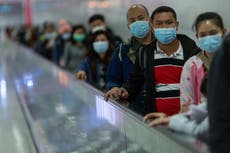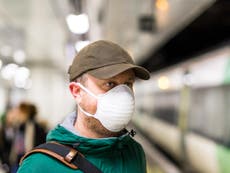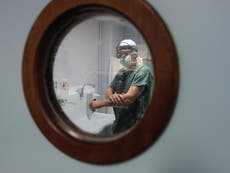Coronavirus: Video conferencing apps and remote GP services thrive as world adapts to social distancing
Social distancing and self-isolation are leading to big changes in how we live and work, writes Ben Chapman
As cities are locked down, flights grounded, restaurants closed due to lack of trade and millions of workers are cooped up at home, it is rapidly becoming clear that the economic damage from coronavirus will be severe.
The new conditions in which we now find ourselves, while unplanned and unwelcome, have given an impetus to quickly adapt how we work, shop, learn and seek medical advice, presenting an opportunity that technology firms have seized.
None could be more indicative of this shift than video conferencing app Zoom which allows teams to conduct meetings from their computers or smartphones.
While stock markets have experienced historic crashes, Zoom has seen its share price jump 50 per cent already this year taking its valuation to $29bn (£23.5bn).
So keen were some investors to jump onto the stock that they mistakenly bought shares in the wrong company. A tiny Beijing manufacturer of phone components called Zoom Technologies – which happens to have the stock market ticker “ZOOM” – saw its valuation unexpectedly double last month.
Zoom’s fortunes are not mere hype however. In China, Zoom gained millions of new users in February shortly after the country enacted its severe isolation and quarantining policies.
The company’s growth rate in China rose more than sevenfold, according to consultancy firm Oliver Wyman. That helped build on already solid growth. Earlier this month, Zoom reported revenues were up 88 per cent in a year to £662m.
For some companies the spectacular increase in demand has led to problems. Even Microsoft, one of only four US firms ever to reach a $1 trillion (£811bn) valuation, experienced service problems yesterday as too many users tried to log in to its Teams video conferencing app.
Some in the industry believe that the necessity of keeping our distance during the pandemic will foster a longer-term, and perhaps overdue, shift in working patterns.
Among them is Moe Vela, chief transparency officer of Transparent Business, which produces monitoring software allowing managers to keep track of their workers’ productivity by taking regular screenshots from their computers.
Such technology is not without its critics. Last month Barclays swiftly withdrew its own employee tracking software after a backlash accusing the bank of adopting “Big Brother” tactics. But Vela says Transparent Business’ technology is “respectful and not invasive”.
Employees can review their day’s screenshots before they are sent to managers meaning that any which relate to periods where they were not working can be excluded.
“Companies where we are in Silicon Valley and elsewhere have been trying to do remote working for a decade,” he says. After an initial burst of enthusiasm, however, many workplaces ditch the idea, fearing it will reduce productivity or have other negative consequences.
“Managers worry, thinking they’ll have no control over their workforce anymore,” says Vela. “We show them that a remote workforce can be effective, it can be efficient and productive.”
Meanwhile, remote working can reduce travel, cutting down on wasted commuting time and delivering meaning benefits for the climate. It also allows increased flexibility which has been demonstrated to improve employees’ morale and wellbeing.
It’s not just offices that are evolving quickly in response to coronavirus. Earlier this month, the NHS ordered England’s 7,000 GP surgeries to conduct as many patient consultations as possible by video connection to help reduce the spread of Covid-19. Before the outbreak less than one in 100 appointments were conducted in this way, but that’s changing fast.
Tech startup Livi is one of the companies working to make the required shift happen. It’s UK managing director Juliet Bauer knows about the problems faced by the health service – she used to run its technology unit NHS Digital.
“As more people self-isolate, we are helping Covid-19 positive patients maintain ready access to GP care at home and minimising the spread of infection,” says Bauer.
“Alongside helping the NHS cope with increased pressure on its services, we’re also making sure that patients can access their GP for other issues, just like normal.”
That’s especially important for some of the people most vulnerable to the virus – those with chronic underlying health conditions like diabetes.
Livi says digital appointments help to deploy the workforce more efficiently by making it easy for GPs to work flexibly and remotely. At a time of exceptional demand and limited resources that will no doubt be welcomed by NHS staff.
Demand for Livi’s digital healthcare doubled across Europe over the past month, in direct response to the virus, says Bauer. She is convinced that patients and doctors, having tried out video consultations, will be ready to make the switch to digital for the long term.
China’s experience may indicate there is much more growth ahead for services like Livi’s. Chinese online GP service Ping An Doctor has seen consultation numbers jump ninefold since the outbreak began taking its total number of visits to 1.1 billion.
Financial services has also witnessed a rapid change in behaviour. The number of insurance premium bought online has surged as have online bank transactions.
For Moe Vela, these can be positive changes in an otherwise bleak outlook: “The primary concern in this pandemic is to protect lives and our health, but it’s so important we also use all of the tools available to lessen the damage it will cause.”
Subscribe to Independent Premium to bookmark this article
Want to bookmark your favourite articles and stories to read or reference later? Start your Independent Premium subscription today.







Join our commenting forum
Join thought-provoking conversations, follow other Independent readers and see their replies
Comments